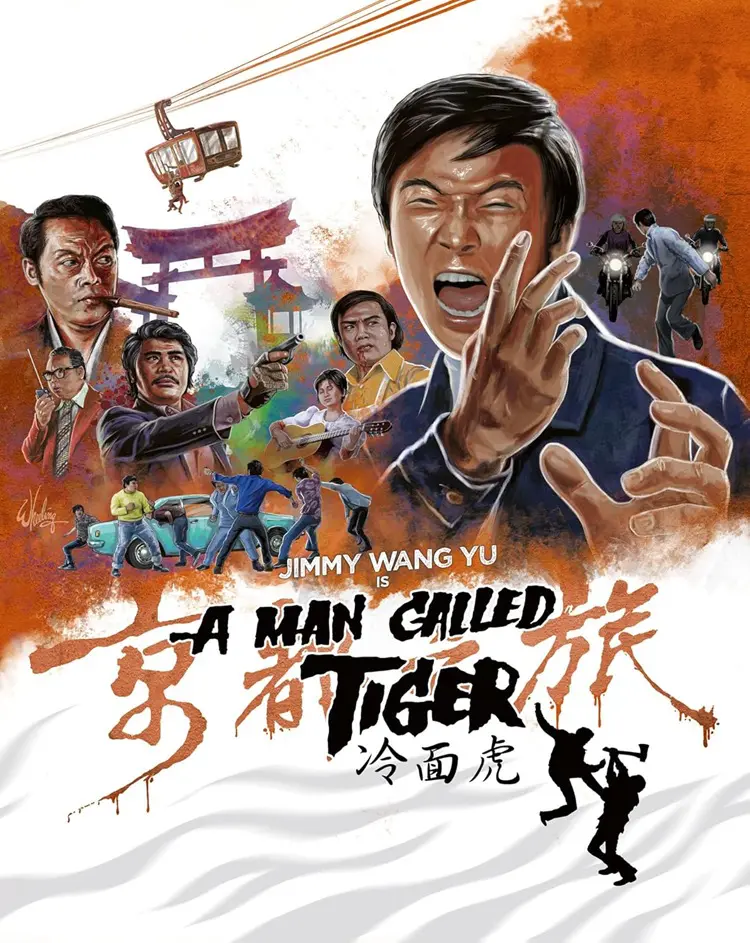
Bruce Lee and director Lo Wei worked together on two films, The Big Boss (1971) and Fist of Fury (1972). While Lee had previously seen some success in America (most notably as Kato in the short-lived television series The Green Hornet), it was these films that launched him into international stardom. Lee and Wei were set to make a third film together but creative differences sent Lee off to make The Way of the Dragon while Wei completed A Man Called Tiger with Jimmy Wang Yu as his star.
Buy A Man Called Tiger Blu-rayFamously (well, famous if you keep us with the history of martial arts cinema), A Man Called Tiger was cut significantly for its international release. Over 30 minutes of exposition and important plot points were excised whilst its many action sequences remained intact. This made the film plenty exciting but rather confusing in terms of actually understanding what was happening. With great effort, Eureka Entertainment now presents the film in its longest available cut (there is some evidence that additional footage was shot for the final film, but it is more or less lost (I’ll talk more about that later).
Honestly, I think I prefer the shorter cut. Sure, it makes very little sense, but all the added exposition makes the whole thing drag. In a film like this, I’m usually just waiting around for the fight scenes anyway, so padding out the run time so I can actually make heads or tails of the story just seems silly.
Jimmy Wang Fu plays Chin Fu. Not Tiger as you might think from reading the title. It isn’t even a nickname. Nobody in this film is ever called Tiger. The title seems to be a leftover from when the film was going to star Bruce Lee and nobody ever bothered to change it. The entire movie is like that. So much of it feels like it was thrown together. Anyway, Chin Fu is a Chinese martial arts expert living in Japan. He’s a good guy as we can see from the opening montage where he saves various randos from street gangs. After knocking them around a bit, he always states his name, that he is Chinese, and where he’s staying. Just in case anybody wants a little revenge, I guess.
Soon enough, he knocks the heads of some Yakuza boys. When they complain to the boss, he hires Chin Fu as his right-hand man. Suddenly, Chin Fu is collecting payments from local businesses and kicking the tails of any rival-gang members. Though the film takes its time explaining this strange turn of heart, we eventually learn Chin Fu’s father was murdered by the Yakuza and he’s infiltrating their ranks to find out who did it and why.
He’ll enlist the help of at least four different women, all of whom fall madly in love with him (in the shortened cut this becomes hilarious as it seems every time he turns around some woman is throwing herself at him with very little context), and an old friend. Together, they’ll try to discover exactly what happened to Chin Fu’s father. And several other fathers. Two of the women also have father issues. Ayako (Okada Kawai) is a nightclub singer whose father has disappeared. He might just be an assassin hired to kill Chin Fu. Emi (Maria Yi) is a nightclub hostess whose father is supposedly in Thailand, but he might just be the guy who cheated Chin Fu’s father at gambling, leading to his supposed suicide. Everyone’s mild-mannered father might just secretly be a bad person, even Chin Fu’s dad.
There is a lot more to it, most of it makes little sense, even in the longer cut, and everything but the action is rather dull. But the action is well made and worth watching. Jimmy Wang Yu was an actor, not a martial arts expert. Something that is glaringly obvious in some of the fight scenes. With Bruce Lee blowing pretty much everyone out of the water in that regard, Jimmy Wang Yu moved towards a more general action style in subsequent films. Still, there is a nice sequence on a cable car that predates a similar one from Moonraker by a couple of years. And the finale involves a massive fight with hatchets and axes that has just got to be seen to be believed.
Eureka Entertainment presents A Man Called Tiger with a new 2K restoration of both the original theatrical version and the much-shortened international version. The longer version makes its first appearance on home video. There is an essay in the booklet that breaks down the many difficulties of securing the longer version, especially the Mandarin audio tracks. It was quite an ordeal. Extras include a new audio commentary from Frank Djeng and Michael Worth on the original, longer version, and Mike Leeder and Arne Venema on the shorter cut. There is a video essay that features some of the bits and pieces of scenes that still remain on the cutting room floor even from the long cut. There is a reversible poster, new artwork, and a nice essay on the film in the booklet.